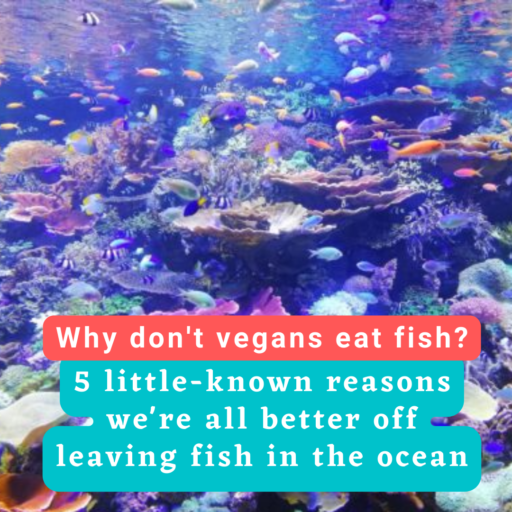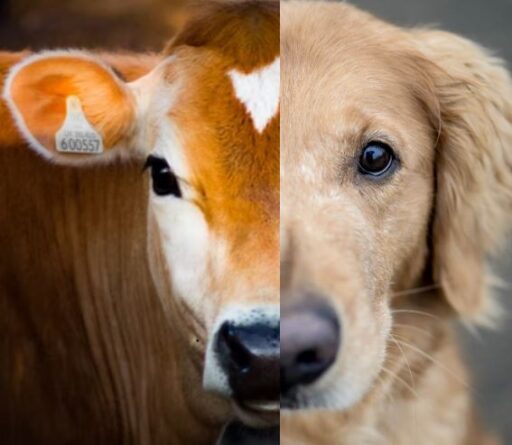It’s often harder for people to feel compassion for aquatic animals like fish because they seem so foreign and distant to us. So, why don’t vegans eat fish? Vegans don’t eat fish in part because they do not consume any sentient animals or animal products. Instead, they eat plant-based foods. Many vegans also don’t eat fish to conserve the ocean’s ecosystem, protect wildlife, promote health, and avoid supporting human rights violations. So, while many vegans don’t eat fish because they, too, are feeling, conscious creatures who feel pain, the case against eating these aquatic animals goes far beyond this.
- 1. Fish want to live, feel pain, recognize you and can enjoy being petted.
- 2. Fish are vital to coral reefs. Fishing destroys the ocean’s ecosystem.
- 3. Commercial fishing causes biodiversity loss by killing marine animal and plant life.
- 4. Fish contain saturated fat, cholesterol, microplastics and mercury
- 5. Human Rights Concerns with the Fishing Industry
- Fish are wildlife, not seafood
1. Fish want to live, feel pain, recognize you and can enjoy being petted.
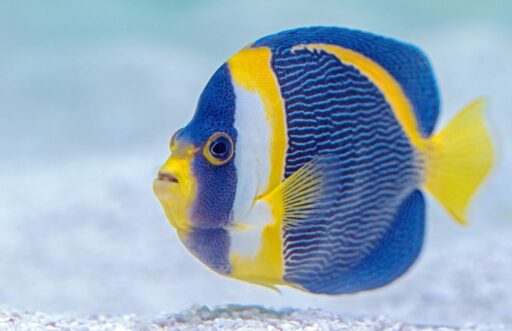
Fish have feelings, too. Seriously. Humans often have a hard time experiencing empathy for fish because their faces cannot show emotion and they cannot cry out in pain when we pull them from the water. But fish, too, know fear and pain. Like humans, other mammals and reptiles, fishes have conscious awareness, or “sentience.”
Because of this ability, they consciously experience pain, have personalities, are intelligent in ways that optimize their survival, recognize individual humans, have memory, communicate, and even have preferred fish companions. Some even enjoy being petted. To reflect the fact that they are individuals, not one indistinguishable mass, some use the term “fishes.”
But fishes suffer greatly because of humans. Commercial fishing operations typically kill over 2 trillion fishes annually in painful ways, often through suffocation. In addition to this, huge numbers of fishes are caught recreationally, as bycatch, or to be fed to farmed fish.
To maximize profits, farm fisheries pack thousands of fish into troughs and cages, with hardly enough room to breathe, and certainly not enough to swim. These conditions are so foul they become cannibalistic, their eyes bleed, sea lice eat off their faces, and they can become riddled with anemia, infectious disease, chlamydia, and heart disease.
In light of this knowledge, are we not compelled to include fishes in our circle of compassion? As Jonathan Balcome, author of What a Fish Knows: The Inner Lives of Our Underwater Cousins, puts it, “When you purchase a product, you tell the manufacturer to do it again, and we really don’t want that happening.” This is the primary reason that ethical vegans don’t eat fish. Even if none of the other concerns were an issue, the fact that fish are sentient creatures is paramount.
2. Fish are vital to coral reefs. Fishing destroys the ocean’s ecosystem.

Many vegans are strongly motivated by reducing the environmental impact of their diets, so for them, the main reason they avoid fish is to protect the ocean’s ecosystem, coral reefs and biodiversity. The ocean environment and its inhabitants function interdependently to provide us with oxygen and absorb huge amounts of heat and carbon dioxide.
Oceans absorb almost all of the Earth’s excess heat and is the biggest carbon sink on the planet, with 93% of all CO2 stored in the ocean. Marine forests – with species like kelp, seaweed and coral reefs – can actually store more carbon than can forests on land. Yet every year, we wipe away 25 million acres of these aquatic forests.
Few people realize that fish themselves are vital to keeping coral reefs alive, as their excretions feed the reefs. Fish carbon also helps stabilize our climate. Yet with current trends, scientists predict that 90% of the world’s coral reefs will die by 2050.
Marketing claims about “Sustainable Seafood” and “Eat Local” are misleading
Even if you attempt to mitigate these concerns through buying fish with labels like “sustainable” and “local,” these are just marketing gimmicks. Despite deceptive marketing claims to the contrary, commercial fishing is inherently unsustainable. As we have seen, fish play an essential role in the ability of our oceans to be a carbon sink.
Commercial fishing denigrates the ocean’s ecosystem not only by pulling from the water the actual marine life that we eat, but the huge numbers of threatened and endangered species caught and killed as bycatch. Finally, the fishing industry leaves behind millions of tons of plastic fishing gear in the water each year, killing marine animal and plant life. In fact, 46% of the Great Pacific Garbage Patch is made up of fishing nets.
Part of the reason the fishing industry continues full-steam ahead – despite dire warnings from scientists – is government subsidies. Like land-based animal agriculture, the fishing industry receives an estimated $35 billion in subsidies each year. While these subsidies make fish and other aquatic animals cheaper at the checkout than it would otherwise be, is it worth the true environmental cost?
3. Commercial fishing causes biodiversity loss by killing marine animal and plant life.
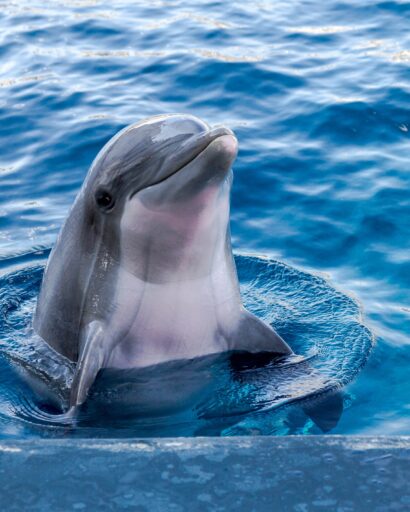
Commercial fishing operations kill and endanger many marine animals. They drag cathedral-sized trawling nets through the water, wiping out mangrove forests and coral reefs. Whales, dolphins, sea turtles, and sharks are trapped indiscriminately as bycatch. They leave behind vast amounts of plastic via discarded fishing gear. Scientists predict that with current fishing trends, the oceans will be virtually empty by 2048.
Because of the fishing industry, over 300,000 whales, dolphins and porpoises are killed each year as bycatch. Over 10,000 dolphins are killed each year just off the coast of France. Six out of seven species of sea turtles are threatened or endangered due to fishing. Globally, about 500,000 sea turtles are killed every year from fishing. Of course, the fish themselves are threatened, too. Pacific Bluefin tuna, who can accelerate faster than a Ferrari – are endangered – today only 3% remain.
4. Fish contain saturated fat, cholesterol, microplastics and mercury

Although fish have been marketed for their supposed health benefits, fish contain saturated fat and cholesterol and often contain microplastics and mercury. Some vegans are primarily motivated by protecting their health, so this might be the foremost reason they avoid eating fish.
Cholesterol
While some people switch from red meat to fish in an effort to lower cholesterol, numerous studies indicate that the impact of beef consumption on cholesterol levels is similar to that of poultry and fish. While industry-sponsored studies may claim otherwise, this is because they often compare their products to an even worse one to try to make theirs look better. In contrast, switching people from meat to tofu does lower cholesterol levels.
Those on vegan diets dropped their cholesterol by 15-25%. Those on healthier vegan diets dropped their cholesterol levels up to 61% within a matter of weeks.
Microplastics
Microplastic pollution in our water doesn’t just threaten our environment, but our health. Microplastics found in seafood are linked to cancer development. An average portion of mussels (250g wet weight) contains about 90 particles and six oysters (100 grams wet weight) has 50 particles. Studies found microplastics in 1 in 5 cans of sardines and in 100% of mussel samples.
We can get omega-3s without these drawbacks from walnuts, chia, flax and hemp seeds, as well as algae oil, which is where the fish get it to begin with.
Mercury
Although fish and fish oil have been hyped for supposed cardiovascular protection, omega-3s and treating depression, systematic reviews have found no benefit for reducing risk of depression, suicide, cognitive decline, or dementia among healthy adults.
Actually, it may even make things worse. Higher fish consumption predicted worse cognitive performance, likely due to neurotoxic contaminants in fish, like mercury.
A prospective study, starting out with people who are not depressed, found that those with higher fruit and vegetable intake had a 28% lower risk of becoming depressed. Those eating high amounts of fruits, veg, and nuts had lower risk of becoming depressed, while there was no protective role found from fish.
Additionally, studies have found increased risk of suicide among male nondrinkers with higher seafood intake. Those with a high baseline fish consumption who increased consumption also increased their risk of mental disorders. This may be due to mercury, which can cause neurological damage, memory loss, and dementia. Furthermore, fish oils have not been found effective for treating depression either.
The same cognitive functions disrupted in adults are the same as those reported to children exposed to mercury in the womb. Both performed more poorly on tests of fine motor speed and dexterity, concentration, and some aspects of verbal learning and memory. The greater the mercury levels, the worse they did.
Other studies have shown that more than 3-4 servings a month of fish like tuna and snapper elevated mercury levels and caused a 4.8% drop in executive dysfunction.
Even if you eat a lot of fish, you can clear the mercury from your blood in several months. But once it gets into your brain, it can be decades before your body can even get rid of half of it.
Pregnancy Concerns with Mercury
One group of particular concern is people wishing to become pregnant. In these studies, the only scenarios that had a significant impact on children’s exposures required mothers to eliminate fish from their diets for 5 years before their children were conceived. The research predicted that substituting plant foods for fish would reduce prenatal and breastfeeding mercury exposures by 37% each and sequent childhood exposures by 23%.
These concerns about neurotoxins apply both to farmed and wild-caught fish. Although farmed fish have even higher levels of pollutants than wild-caught, you can’t be sure which you’re really getting. This is because mislabeling rates for fish and other seafood in the US falls between 30-38%.
5. Human Rights Concerns with the Fishing Industry
Human rights abuses and dangerous working conditions
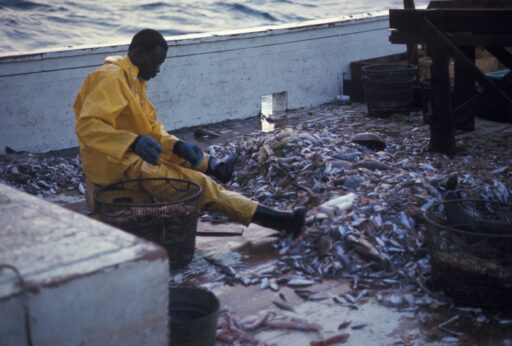
Much fish is imported from Thailand, where the industry relies on migrant and child slave labor. Slave labor is used to harvest fish that supply the global market, and child and migrant labor is used in processing plants. There are significant, widespread risks of trafficking and slavery at all steps in the production supply chain.
Wild-caught fish often depends on slave labor, too. A 2018 article in The Guardian reported that forced labor has happened on boats, where “workers were trapped in jobs they couldn’t leave, suffered from physical abuse, lack of food, long hours, and awful working conditions.” A 2019 article also from The Guardian reported the story of a young Cambodian man tricked into slavery in the Thai fishing industry.
Fishing has one of the highest mortality rates among any occupational groups. A 2017 article in the American Journal of Industrial Medicine reported that commercial fishing fatality rates in the U.S. are many times higher than the rate for all workers. Despite some decline, the industry continues to have one of the highest occupational fatality rates in the U.S. In West Africa, fishermen have the highest mortality rates of any fisheries worldwide.
Threatened livelihoods for sustenance fishermen

One argument people sometimes pose in an effort to justify fish consumption is, “But some people have to fish to survive!” As it turns out, this is actually a reason for people who don’t have to consume fish to survive, not to. This is because commercial fishing operations threaten the livelihoods of sustenance fishermen.
A 2021 article in Fish and Fisheries reported that 120 million people are dependent on fisheries for their livelihoods, almost 97% of those people are in developing countries and more than 90% participate in small-scale fisheries.
A 2021 article in Energy Research and Social Science found that small-scale fishing communities experience negative impacts from the commercial fishing industry because of pollution, dwindling fish stock and overall marginalization that leads to reduced access to their ocean-based livelihoods.
For vegans who are primarily motivated by social justice causes, avoiding support of this shady industry may be a primary motivation.
Fish are wildlife, not seafood
As we have seen, there are five primary reasons why vegans don’t eat fish. Avoiding fish consumption protects the ocean’s ecosystem, preserves wildlife like dolphins and whales, promotes our own health, avoids supporting human rights violations, and respects that fish are conscious, feeling creatures.
At the individual level, as consumers who do not need to eat fish to survive, how can we justify needlessly buying it and perpetuating these systems? It’s time we reframe how we view fish: not as seafood, but as wildlife. Let’s keep fish in the ocean, where they belong.
To learn more about the vast environmental and human rights concerns with eating fish in an engaging and inspiring way, check out the Netflix documentary Seaspiracy.
Share what you learned with your friends!
